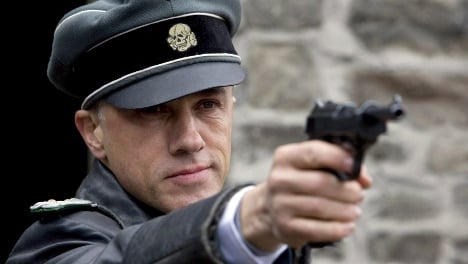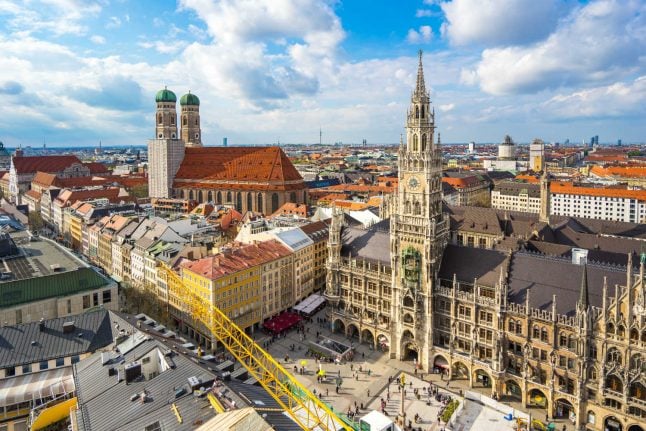Berlin daily Der Tagesspiegel wrote this week that after 65 years of portraying Nazis with “shuddering obeisance before evil,” Tarantino’s explosive film is “Catharsis! Oxygen! A wonderful retro-futuristic frenzy of fantasy!”
Average German cinema-goers also seemed bowled over at the premiere in Berlin on Thursday evening, roaring with laughter and applause throughout the film.
“It felt so good to finally say, ‘Kill! Kill all the Nazis!’” a 20-year-old student raved as he left Berlin’s CineStar theatre.
Set “Once upon a time,” in occupied France, two parallel plot lines focus on Jews exacting bloodthirsty revenge for the Holocaust by assassinating Hitler at a propaganda film premiere in Paris. While a band of renegade American-Jewish soldiers led by Brad Pitt called “The Basterds” hunts and mercilessly kills Nazi soldiers behind enemy lines, an outwardly meek French Jew living under an assumed identity plots a fiery revenge for her family’s death.
The script, inspired by Italian director Enzo Castellari’s 1978 movie “The Inglorious Bastards,” features Tarantino’s typically witty dialogue and cartoonish violence – but German critics are most fascinated by how it challenges standard Nazi film constructs and archetypes.
Nazis speaking German
Tarantino’s insistence on the authentic use of language – there are no Nazi officers speaking with British accents here – led him to cast a pack of top-notch German and French actors who are largely unknown abroad.
They speak in their native German, French and English – a refreshing tactic that elevates the importance of language in cinema to a “new level,” daily Die Welt gushed on Friday, insisting that Germans see the original, not the German-dubbed version of the film.
“Tarantino’s insatiable, prejudice-free curiosity for the details makes him a model globaliser,” the paper said, adding that, “German (and in general, European) pop culture profits from this.”
Whether a character lives or dies in the film hinges on language skills, and arguably the strongest character is SS Colonel Hans Landa, a.k.a. “The Jew Hunter,” whose fluent French, English and Italian skills help him uncover the Jews’ murderous plot. Austrian actor Christoph Waltz won best actor at the Cannes Film Festival this year for his elegantly sinister portrayal of the character, and German critics have raved that he stole the show from Hollywood darling Brad Pitt.
Meanwhile the monolingual American characters find themselves in a pickle due to their lack of language skills. At one point double agent and German actress Bridget von Hammersmark, played by a flinty Diane Kruger, asks: “I know this is a silly question before I ask it, but do you Americans speak any other language than English?”
The film’s focus on accents and linguistic ability underlies frequent references to ethnic and national stereotypes. There is a fascinating interplay between Pitt’s character, who has Native American ancestry, and demands his soldiers bring him “100 Nazi scalps,” and German characters who later reference one of their most legendary pulp fiction characters, an idealised Native American Noble Savage character called “Winnetou.”
During this scene actress von Hammersmark insists that just because Winnetou was created by German author Karl May doesn’t mean he’s not an American character – mirroring the American director’s choice to turn the standard lamb-at-the-slaughter portrayal of Jewish Holocaust victims on its head.
Kosher porn?
Instead, the film is what Eli Roth, who played the most savage member of The Basterds, Boston Jew Donny Donowitz, told the LA Times is “kosher porno.”
Styling Jewish characters to retaliate against their brutal oppressors is certainly daring, but German critics are loving it.
“Many are asking the question: is this allowed? Can someone portray Jews as killers who also have fun with their murderous work?” German-Israeli publicist Rafael Seligmann wrote in news magazine Stern, referring to ongoing trauma to second and third-generation descendants of Holocaust victims.
“When the Jews are in that position, they behave the same as all others. They defend themselves, they attack,” Seligman wrote, adding that had Jews been better armed during the war, the few known resistance movements may have been more successful. “They didn’t become better people through Auschwitz. They learned much more to defend themselves.”
The film levels the playing field for Jews and Nazis, he says, showing that the violent revenge of the helpless is “all too human.”
And after this revelation, “Pope Quentin” goes on to manifest the “biggest exorcism of all,” daily Die Welt opined.
“He manages finally to send this Hitler to the devil in a way besides suicide,” the paper said. “Historic accuracy is a virtue, but fantasy brings liberation.”







 Please whitelist us to continue reading.
Please whitelist us to continue reading.
Member comments